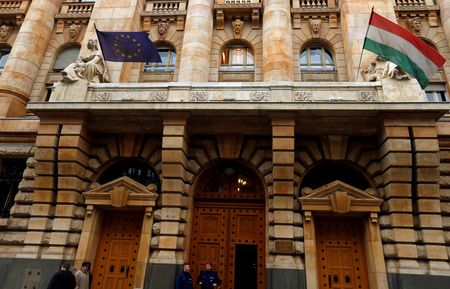By Gergely Szakacs and Krisztina Than
BUDAPEST (Reuters) – The National Bank of Hungary (NBH) left its base rate unchanged at 13% on Tuesday and pledged to maintain tight monetary conditions for a “prolonged period”, with inflation only set to decrease more significantly from mid-2023.
The central bank said annual inflation, which was running at 21.1% in October, was now primarily driven by a surge in food prices, where further “unpleasant surprises” could be on the cards in coming months.
“We need all channels of monetary transmission, and especially the exchange rate channel, to curb inflation,” Deputy Governor Barnabas Virag told an online briefing.
After last month’s emergency rate rise to shore up the forint, Central Europe’s worst-performing currency with a 10% loss versus the euro in 2022, the bank on Tuesday reiterated its pledge to offer its new quick deposit tool at an 18% rate “as long as necessary”.
“The NBH focuses on sustained shifts in financial market conditions, and it will use its instruments introduced in mid-October until a trend improvement in risk perceptions occurs,” the Monetary Council said.
On Monday, however, the government capped deposit rates for certain large institutional and private investors at the three-month Treasury bill yield until March, which some analysts said would harm the efficiency of monetary transmission.
When asked about the government’s move, Virag said there was no alternative to curbing inflation and the bank needed all channels of monetary transmission for that.
“With respect to yesterday’s decision, we need some time to see how it will impact individual sub-markets,” Virag added.
Economists project Hungary’s average inflation will rise to 16% next year from 14.3% expected in 2022, while economic growth is seen grinding to a halt.
At 1557 GMT, the forint was trading at 407.85 per euro, a shade firmer than levels right after the rate announcement.
Economists at brokerage Erste Investment said Monday’s government move could channel funds from institutional investors and wealthy private clients towards government bonds.
“The measure can be slightly positive for OTP, however this step impairs the monetary transmission of the central bank,” the analysts said.
The forint has been pressured by the NBH prematurely halting rate hikes in September with price growth still on the rise, Hungary’s high exposure to Russian energy imports, and a funding row with the European Union that has hampered access to billions of euros of financing.
(Reporting by Gergely Szakacs and Krisztina Than; Editing by Nick Macfie, Alexandra Hudson)

